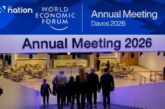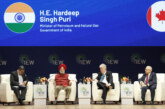
Dr. Arvind Kumar*

Human rights are rights we have simply because we exist as human beings – they are not granted by any state. These universal rights are inherent to us all, regardless of nationality, sex, national or ethnic origin, color, religion, language, or any other status. They range from the most fundamental – the right to life – to those that make life worth living, such as the rights to food, education, work, health, and liberty. Someone’s right to life is not dependent on someone else promising not to kill him or her. Their right to life is dependent on only one thing: that they are human. Without human rights we cannot achieve our full potential. Human rights simply extend this understanding on an individual level to every human being on the planet. If I can make these claims, then so can everyone else as well. Despite this 2022 saw new, renewed and protracted conflicts that led to appalling tragedies. Some of them amounted to war crimes and crimes against humanity. Across the world, authorities continued their heavy-handed repression of universal freedoms. Economic crises led to rocketing price rises for food and fuel and increased pressure on health gender-based violence, discrimination other social services. The most marginalized were hit the hardest, and inequality rose like we are witnessing in Middle East. Nothing can justify the deliberate killing, injuring and kidnapping of civilians – or the launching of rockets against civilian targets” rightly said by Anthony Guetress UN Secretary General’.

The Israeli-Palestinian conflict has been a longstanding and deeply entrenched dispute that has not only caused immeasurable human suffering but also has significant potential to inflict severe environmental damage and consequences that must not be overlooked. The violence inflicted on both sides is a horrifying reminder that regional transformation, grounded in integration and normalization between Arab and Israeli states long hostile to one another, remains far off. Volker Turk UN High Commissioner for Human Rights visited Palestine recently and reported “Rarely have I heard such disturbing testimony about the catastrophic harm that ordinary people have endured, and which continues to mount. And never in my career of working in many crisis situations around the world have I met such an outpouring of fear, anger and despair. The international community has an obligation to prevent atrocity crimes, including genocide, and should immediately consider all diplomatic, political and economic measures to that end, I also share the deep sense of foreboding of many of my interlocutors about the risk of spill over into the wider Middle East region, if the current trajectory continues” he urged immediate action by UN Member States and the UN system as a whole.
Multiple Impacts of conflict/war
In March this year, the World Bank, the Government of Ukraine, the European Union and the United Nations published a report — Ukraine Rapid Damage and Needs Assessment1 — covering the first year of the ongoing conflict between Ukraine and Russia, to inform the extent of the damage suffered by Ukraine and provide an estimate of the likely cost of the recovery. The report estimates an overall damage over the period February 2022 to February 2023 of US$134.7 billion and indicates that for the period 2023–2033, the needs of Ukraine amount to US$410.6 billion. The report show the economic sectors hit the most — housing, transport, energy and extractives, industry and agriculture. A more in-depth look at the detailed figures and analyses also reveals the substantial impacts on irrigation and water resource management as well as water supply and sanitation. The overall damage to the water infrastructure is estimated to be US$2.6 billion, whereas the corresponding needs over the next decade are estimated to be US$16.0 billion. Similarly the Israel Palestine war is already throttling the ever weak economy.
Today, among both Israelis and Palestinians, entirely separate narratives are building up, parallel to each other and with no connection between them. Profound historical traumas have been revived. World is pleading for everyone to recognise and acknowledge this depth of pain, and the reality of the humanity and the suffering of the other. This is perhaps the most important recommendation: it is essential that all parties acknowledge that all human lives have equal value. A vortex of disinformation and dehumanising rhetoric is tugging people away from reason and humanity, blocking the work of identifying and clearing the way out and forward. Women, children and newborns in Gaza are disproportionately bearing the burden of the escalation of hostilities. Women and girls were raped and murdered by Hamas and endured torture that is now, disturbingly, being denied or diminished or hand-waved away. Similarly women are going into labor in Gaza and can’t get basic care; they may pay for pregnancy with their lives, whose children may die before they fully enter the world, whose lives are written off as collateral damage.
India’s balanced stance

Over the years, India has been maintaining that its position on the Palestine question has been clear and consistent and that it is committed to supporting all efforts to resume direct negotiations between Israelis and Palestinians to achieve a two-state solution and condemns the killing of the civilian people — whether they are Palestinians or Israelis. India is getting involved in international issues very actively and can play some positive role in ending the war. As an emerging power in the world now, and after the initiatives it took like the G20 and Voice of Global South Summit, India can play a bigger role. The war has brought fresh global headwinds for the Indian economy. Ever since the war broke out earlier this month, international crude oil prices have risen over 5 per cent and US bond yields have breached the 5 per cent-mark to hit 16-year high levels. When oil prices rise, the cost of production for various industries and energy costs for businesses and households also surge, driving global inflation higher. High energy prices and new inflationary trends could undermine the efforts of central banks to bring inflation under control. With this, central banks across the globe will continue hiking interest rates, which will slow down the global economic growth.
India has welcomed efforts for humanitarian pauses in the Israel-Hamas conflict as well as efforts by the international community aimed at de-escalation and delivery of urgent humanitarian assistance to the people of Palestine. Prime Minister Narendra Modi has been continuously in his statements condemning war, at the BRICS meeting and at the recent G20 virtual meeting where he said that there is a seven-point convergence among G-20 leaders about the Hamas-Israel war, including the need for a two-state solution, even as he hoped that the ongoing conflict will not escalate into a regional conflagration.
Way Ahead
In a situation like this where you have an ongoing military engagement and offensive done by both sides the first thing you start with is the call for ceasefire and stop the targeting of civilians and hospitals and schools and any other civilian targets. There should be a pathway corridor for humanitarian and medical relief to be delivered to the hospitals, to the families, to people who are without shelter. Destroying Gaza and killing civilians are not making Israelis safe. These actions will breed more terrorism, across the region and beyond. There is no military solution to this conflict. For too long the world has spoken of a two-state solution while allowing Israel to build a one-state reality. This has suited extremists in Israel and Palestine who deny the other country’s right to exist. It is time to end the empty rhetoric, and implement a serious peace plan that undermines extremists. De-escalation is not enough. We cannot go back to managing the conflict. It will erupt again and again with more death and misery. The conflict must be resolved, permanently, through negotiation. Is this the kind of world we want to leave for our children? We have to remember an eye for an eye leaves the whole world blind.
*Editor, Focus Global Reporter



